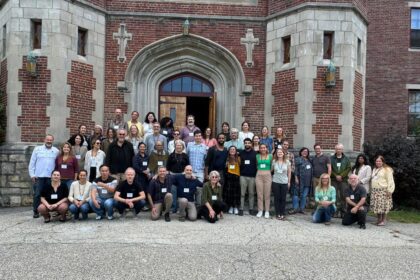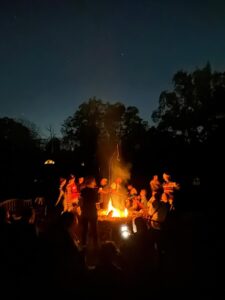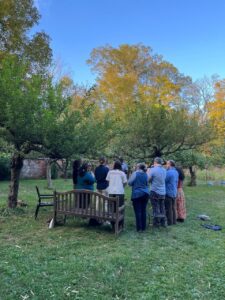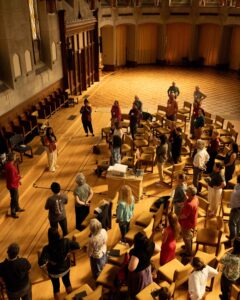
By Karen Nordstrom, Policy Program Co-Director, Food Solutions New England, and Ernesto Méndez, Faculty Director, UVM Institute for Agroecology
In the realm of food systems and planetary health, innovation often emerges from unexpected places. Recently, a group of colleagues from Food Solutions New England (FSNE) and the University of Vermont’s Institute for Agroecology (IfA) attended a unique retreat at the Garrison Institute that brought together food systems leaders from diverse locations and territories. This gathering, co-hosted by the UNDP-convened Conscious Food Systems Alliance (CoFSA) and the Garrison Institute’s Pathways to Planetary Health Program offered a rare opportunity to bridge contemplative practices with work on food systems transformation, creating a rich environment for collaboration and exchange. The seamless integration of consciousness approaches with practical networking allowed us to explore inner and collective transformation towards planetary health, while forging meaningful connections with fellow leaders in the field.

Photo: Stephen Posner, Director of Pathways to Planetary Health, Garrison Institute
The Power of Place
Set against a backdrop of breathtaking natural beauty, the venue itself played a crucial role in our experience. The surroundings at the Garrison Institute, with meandering paths, gardens and labyrinth, which overlook the Hudson River and the landscape beyond, not only provided inspiration but also aligned well with our focus on food systems and planetary health. The exceptional meals, most of them sourced from nearby farms, nourished us while demonstrating a commitment to sustainable food systems. The environment was both nurturing and conducive to deep engagement.
Consciousness Practices: The Heart of Transformation
At the core of our retreat were consciousness practices and teachings drawn from various spiritual and wisdom traditions. These practices were not mere add-ons but integral components that wove together content and praxis. Participants engaged in a diverse array of activities, including:
- Mindful eating exercises to cultivate presence and gratitude
- Nature connection practices to deepen our relationship with the environment
- Mindful walking meditations to foster embodied awareness
- Qigong sessions for energy cultivation and holistic well-being
- Earth Treasure Vase ceremonies to bring balance and protection to the area
- Sitting meditation to develop inner stillness and insight
- Indigenous ceremonies to honor ancestral wisdom and connection to the land
- Forest bathing experiences for stress reduction and eco-therapy
- Contemplative-based resilience practices to build emotional strength and adaptability
In addition, the ability to self-select into groups focused on topics central to our work facilitated effective co-learning and provided practical tools for inner and collective transformation. A combination of small group discussions and varied plenary activities created an inclusive environment where diverse perspectives could be shared and heard.
 A Hub of Connection and Collaboration
A Hub of Connection and Collaboration
The Conscious Food Systems as a Pathway to Planetary Health Retreat served as a vibrant hub for connection and collaboration. This gathering brought together a diverse array of participants, creating a rich environment for knowledge exchange and partnership building.
The retreat provided invaluable networking opportunities across various sectors and scales. In terms of regional connections, the event facilitated meaningful interactions with key organizations working on food systems and environmental issues in the Northeast. These included organizations like Agrarian Trust and the Northeast Farmers of Color Land Trust, as well as regional initiatives focused on bioregional and integrated landscape approaches. Connections were also made with local farmers from the Hudson Valley, showcasing the retreat’s commitment to bridging academic and practical farming knowledge.
The diversity of participants extended to the research community, with representatives from various academic institutions, including liberal arts colleges and land-grant universities. This mix of researchers brought together expertise in agroecology, food systems, and environmental studies, fostering potential collaborations and knowledge sharing. The presence of funders from organizations such as the McKnight Foundation, the Global Alliance for the Future of Food, and the Fetzer Institute added another layer to the networking opportunities.
On the international front, the retreat facilitated connections with leaders in global development and climate action. Participants included representatives from CoFSA, an alliance of the United Nations Development Programme (UNDP), and international organizations focused on indigenous peoples and forests. These connections provided valuable insights into global perspectives on food systems and environmental challenges.
The retreat also highlighted the importance of intergenerational dialogue, with participation from youth climate activists and established leaders in the field. This mix of perspectives enriched discussions and laid the groundwork for mentorship and collaboration across different career stages.
For those of us working in academia, new and inspiring connections were made across several institutions. Interactions with faculty and staff set the stage for in-depth discussion on transforming higher education, especially in the context of food systems and environmental studies. These conversations explored how to integrate consciousness approaches into curriculum, research, and campus life, paving the way for advancing innovative educational models.
Overall, the retreat’s emphasis on networking and collaboration created a fertile ground for new partnerships, project ideas, and shared learning. By bringing together such a diverse group of actors, the event fostered an inclusive approach to addressing complex food systems and environmental challenges. Participants were able to engage and better understand the power of conscious collaboration for driving meaningful change.
Impact and Future Directions

Photo: Courtney Sofiah Yates (www.courtney-yates.com | @courtsyy )
The retreat had a significant and multi-faceted impact on our work in food systems, climate change, and planetary health. It provided valuable frameworks and methodologies that will influence strategies and initiatives across various platforms and scales of our work. The insights gained are directly informing our efforts with Food Solutions New England (FSNE) and the University of Vermont’s Institute for Agroecology (IfA), particularly in areas of strategic planning and organizational development.
At FSNE, we are integrating these approaches into our long-term planning and policy initiatives. For instance, the retreat’s emphasis on consciousness and holistic thinking is aligned with our approach to the 2025 FSNE Racial Equity Habit-Building Challenge and is shaping our work on regional food system resilience. At the IfA, these insights are enhancing our community-based research projects and informing the development of a new ‘Consciousness’ program for transformative agroecology. As we continue to apply and refine these approaches in our work with FSNE and IfA, we anticipate that they will contribute to reshaping how we approach food systems and planetary health on a broader scale.
This retreat was a transformative experience, providing not just knowledge and skills, but also a renewed sense of purpose and connection. As we continue our work in food systems and planetary health, the lessons learned and relationships forged during this gathering will undoubtedly play a crucial role in shaping a more sustainable and conscious future.




